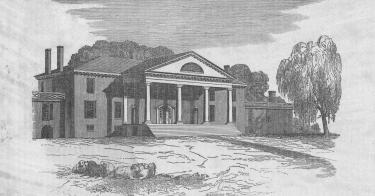Claims are a video now being shown at James Madison’s Montpelier is on slavery’s lasting legacies and features protesters carrying “I can’t breathe,” “Stop police brutality,” and “Black Lives Matter” signs and others waving Confederate flags.
As detailed in a recent Heritage Foundation report, Montpelier today has numerous exhibits on race and slavery, yet none on James Madison’s accomplishments. Mr. Madison’s contributions are discussed only during the house tour and through a brief video in the visitors center.
This is not giving Mr. Madison his due. As the Father of the Constitution, author of the Bill of Rights and many of The Federalist Papers, Mr. Madison’s legacies include the oldest written constitution in history and the first nation committed to self-government. Still, the video on slavery’s lasting legacies is longer than the one on Mr. Madison’s ideas, America’s “moments of triumph” diminished with Mr. Madison himself.
Why? It helps to follow the money. Consider who Montpelier worked with—and who gave it funding.
>>> A Tale of Three Presidential Houses: The Good, the Bad, and the Ugly
First is the Southern Poverty Law Center, a group that Daniel Pipes of the Middle East Forum calls “a left-wing hatchet group, using its accumulated prestige to go after legitimate organizations and individuals.” They are “a hugely rich institution with a formidable reputation lacking a raison d’etre or even a moral conscience.”
Montpelier invited SPLC associates to develop the video, serve on their board of directors, and help produce a set of standards for how slavery should be taught at historical sites. According to their recommendations, “it is not enough simply to discuss the humanity and contributions of the enslaved. It is imperative that these institutions also unpack and interrogate white privilege and supremacy and systemic racism.”
The nongovernmental organization that owns Montpelier, the National Trust for Historic Preservation, oversees 27 historic sites. The trust was established in 1949 by an act of Congress and received $4.2 million in government grants during the 2020 tax year to add to its $412 million in assets.
Though they enjoy tax-exempt status as a 501(c)(3), in 2020, they issued the following statement: “Black Lives Matter. Black History Matters. Historic places of all types and periods should be places of truth-telling and inclusivity. Historic preservation must actively advance justice and equity for all people. Historic preservation organizations have an obligation to confront and address structural racism within our own institutions. …”
Their subsidiary, the African American Cultural Heritage Action Fund, is funded by corporations like Ford, Hewlett, Mellon, and the Open Society Foundations, George Soros’s group. Mr. Soros is a Democratic donor with immense influence. He recently poured tens of millions of dollars into local district attorney elections, in jurisdictions that are now experiencing a surge in violent crime.
Of these players, David Rubenstein, a billionaire “patriotic philanthropist” and co-founder and co-chairman of The Carlyle Group, seems the least political. According to his book, The American Story: Conversations With Master Historians,” he has given significant donations to numerous historical sites to enhance “interest in learning more about American history.” At Montpelier, his funding made possible the exhibit “The Mere Distinction of Colour.” A panel there recognizing Rubenstein’s contribution also features a quote from critical race theory practitioner Ta-Nehisi Coates, a journalist who referred to 9/11 responders as “menaces of nature” who were “not human” and portrayed Dr. Jordan Peterson as a Nazi.
While interested in American history, Mr. Rubenstein is contributing to its distortion. Mr. Rubenstein claims that when Thomas Jefferson wrote “all men are created equal,” he “really meant all white men who were Christian are equal if they have some money.” Men refer to mankind, and Jefferson was a staunch advocate for religious freedom.
Finally, Montpelier received funding from the federal government and the Commonwealth of Virginia.
In 2019, Montpelier obtained a federal grant from the Institute of Museum and Library Services for work that included a children’s exhibit to foster “conversations about fairness, justice, and race between children and their caregivers.”
In 2020, they were awarded funding from the Commonwealth of Virginia for major projects and for “curriculum development for anti-racist curriculum that would be available for use in public schools throughout Virginia.”
If conservatives refuse to engage and ignore spaces like Montpelier, we leave that void to be filled by others: in more places. The National Trust oversees 27 historical sites, and Rubenstein recently gave $10 million to the National Park Foundation for new exhibits at the Thomas Jefferson Memorial that will bring an “inclusive spirit” and “provide a broader, more multi-faceted understanding of President Jefferson’s impact.”
The project at Montpelier, aided by the above individuals and organizations, has been ambitious. They have restored Mr. Madison’s mansion to tear down our history.
The American story is not one based on slavery and oppression but a chronicle of striving toward freedom against the odds dictated by the history of humanity, of the contributions of generations that moved us toward a fuller realization of our principles. James Madison was an essential actor in that story. He deserves better at Montpelier.
This piece originally appeared in The Washington Times




